| Listing 1 - 10 of 11 | << page >> |
Sort by
|
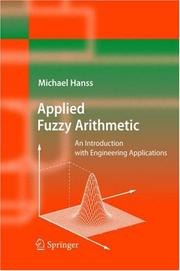
ISBN: 3540242015 Year: 2005 Publisher: Berlin : Springer,
Abstract | Keywords | Export | Availability | Bookmark
 Loading...
Loading...Choose an application
- Reference Manager
- EndNote
- RefWorks (Direct export to RefWorks)
Applied Fuzzy Arithmetic provides a well-structured compendium that offers both a deeper knowledge about the theory of fuzzy arithmetic and an extensive view on its applications in the engineering sciences, making it a resource for students, researchers, and practical engineers. The first part of the book gives an introduction to the theory of fuzzy arithmetic, which aims to present the subject in a well-organized and comprehensible form. The derivation of fuzzy arithmetic from the original fuzzy set theory and its evolution towards a successful implementation is presented with existing formulations of fuzzy arithmetic included and integrated in the overall context. The second part of the book presents a diversified exposition of the application of fuzzy arithmetic, addressing different areas of the engineering sciences, such as mechanical, geotechnical, biomedical, and control engineering.
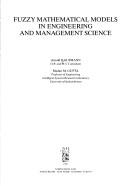
ISBN: 0444705015 Year: 1988 Publisher: Amsterdam : Elsevier Science Publishers
Abstract | Keywords | Export | Availability | Bookmark
 Loading...
Loading...Choose an application
- Reference Manager
- EndNote
- RefWorks (Direct export to RefWorks)
Fuzzy numbers --- Fuzzy arithmetic --- Mathematical models --- Fuzzy arithmetic. --- Fuzzy numbers. --- Mathematical models.
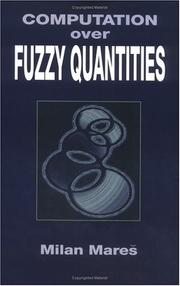
ISBN: 0849376351 Year: 1994 Publisher: Boca Raton : CRC press,
Abstract | Keywords | Export | Availability | Bookmark
 Loading...
Loading...Choose an application
- Reference Manager
- EndNote
- RefWorks (Direct export to RefWorks)
Fuzzy sets. --- Fuzzy arithmetic. --- Ensembles flous --- Logique floue
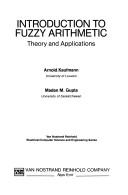
ISBN: 0442008996 0442230079 Year: 1991 Publisher: New York : Van Nostrand Reinhold,
Abstract | Keywords | Export | Availability | Bookmark
 Loading...
Loading...Choose an application
- Reference Manager
- EndNote
- RefWorks (Direct export to RefWorks)
Discrete mathematics --- Number theory --- Fuzzy numbers --- Fuzzy arithmetic --- Fuzzy numbers. --- Fuzzy arithmetic. --- 519.21 --- 681.3*G1 --- 681.3*G1 Numerical analysis --- Numerical analysis --- 519.21 Probability theory. Stochastic processes --- Probability theory. Stochastic processes --- Numbers, Fuzzy --- Fuzzy sets --- Arithmetic
Book
Year: 2021 Publisher: Basel, Switzerland MDPI - Multidisciplinary Digital Publishing Institute
Abstract | Keywords | Export | Availability | Bookmark
 Loading...
Loading...Choose an application
- Reference Manager
- EndNote
- RefWorks (Direct export to RefWorks)
The present book contains the 24 total articles accepted and published in the Special Issue “Fuzzy Sets, Fuzzy Logic and Their Applications, 2020” of the MDPI Mathematics journal, which covers a wide range of topics connected to the theory and applications of fuzzy sets and systems of fuzzy logic and their extensions/generalizations. These topics include, among others, elements from fuzzy graphs; fuzzy numbers; fuzzy equations; fuzzy linear spaces; intuitionistic fuzzy sets; soft sets; type-2 fuzzy sets, bipolar fuzzy sets, plithogenic sets, fuzzy decision making, fuzzy governance, fuzzy models in mathematics of finance, a philosophical treatise on the connection of the scientific reasoning with fuzzy logic, etc. It is hoped that the book will be interesting and useful for those working in the area of fuzzy sets, fuzzy systems and fuzzy logic, as well as for those with the proper mathematical background and willing to become familiar with recent advances in fuzzy mathematics, which has become prevalent in almost all sectors of the human life and activity.
Research & information: general --- Mathematics & science --- bipolar gradation of openness --- bipolar gradation of closedness --- bipolar fuzzy topology --- bipolar gradation preserving map --- fuzzy collaborative forecasting --- dynamic random access memory --- partial consensus --- fuzzy intersection --- fuzzy linear system --- fuzzy number --- fuzzy number vector --- embedding method --- inductive and deductive reasoning --- fuzzy logic (FL) --- scientific method --- probability and statistics --- Bayesian probabilities --- fuzzy implication --- ordering property --- least fuzzy negation --- t-conditionality --- neutrosophic set --- plithogenic set --- fuzzy set --- entropy --- similarity measure --- information measure --- Hyers-Ulam stability --- pexider type functional equation --- intuitionistic fuzzy normed spaces --- alternative fixed point theorem --- interval-valued fuzzy competition graph --- interval-valued fuzzy p competition graph --- interval-valued fuzzy neighbourhood graph --- interval-valued m-step fuzzy competition graph --- homomorphism of graph products --- max-min algebra --- fuzzy max-T algebra --- Łukasiewicz triangular norm --- max-Łukasiewicz algebra --- parametric solvability --- soft set --- fuzzy soft set --- multi-fuzzy set --- multi-fuzzy soft set --- ℒℳℱ?? --- similarity measure of ℒℳℱ?? --- site selection --- shopping mall site selection --- linguistic terms for fuzzy variable --- fuzzy AHP --- fuzzy TOPSIS --- octahedron set --- i-octahedron subgroupoid --- i-octahedron ideal --- i-sup-property, i-octahedron subgroup --- i-octahedron subring --- interval matrix --- interval eigenvector --- strong interval eigenvector --- fuzzy nonlinear systems --- fuzzy arithmetic --- fuzzy calculus --- multidimensional fuzzy arithmetic --- RDM fuzzy arithmetic --- fuzzy parametric form --- fuzzy measures --- monotone measures --- product spaces --- Schauder fixed point theorem --- fuzzy normed linear space --- t-norm --- measure of non-compactness --- fuzzy logic connectives --- law of importation --- α-migrativity --- distance measure --- fuzzy differential equations --- fuzzy difference equations --- mixed continuous-discrete model --- strongly generalized Hukuhara differentiability --- time value of money --- GEFS --- SEFS --- fuzzy relations: fuzzy sets --- max–min composition --- min–max composition --- monotone statistical parameters --- fuzzy statistics --- FAHP --- FTOPSIS --- FCOPRAS --- hexagonal fuzzy number --- governance --- fuzzy logic --- management system --- type-2 fuzzy set --- fuzzification --- type-reduction --- defuzzification --- B-spline surface model function --- bipolar gradation of openness --- bipolar gradation of closedness --- bipolar fuzzy topology --- bipolar gradation preserving map --- fuzzy collaborative forecasting --- dynamic random access memory --- partial consensus --- fuzzy intersection --- fuzzy linear system --- fuzzy number --- fuzzy number vector --- embedding method --- inductive and deductive reasoning --- fuzzy logic (FL) --- scientific method --- probability and statistics --- Bayesian probabilities --- fuzzy implication --- ordering property --- least fuzzy negation --- t-conditionality --- neutrosophic set --- plithogenic set --- fuzzy set --- entropy --- similarity measure --- information measure --- Hyers-Ulam stability --- pexider type functional equation --- intuitionistic fuzzy normed spaces --- alternative fixed point theorem --- interval-valued fuzzy competition graph --- interval-valued fuzzy p competition graph --- interval-valued fuzzy neighbourhood graph --- interval-valued m-step fuzzy competition graph --- homomorphism of graph products --- max-min algebra --- fuzzy max-T algebra --- Łukasiewicz triangular norm --- max-Łukasiewicz algebra --- parametric solvability --- soft set --- fuzzy soft set --- multi-fuzzy set --- multi-fuzzy soft set --- ℒℳℱ?? --- similarity measure of ℒℳℱ?? --- site selection --- shopping mall site selection --- linguistic terms for fuzzy variable --- fuzzy AHP --- fuzzy TOPSIS --- octahedron set --- i-octahedron subgroupoid --- i-octahedron ideal --- i-sup-property, i-octahedron subgroup --- i-octahedron subring --- interval matrix --- interval eigenvector --- strong interval eigenvector --- fuzzy nonlinear systems --- fuzzy arithmetic --- fuzzy calculus --- multidimensional fuzzy arithmetic --- RDM fuzzy arithmetic --- fuzzy parametric form --- fuzzy measures --- monotone measures --- product spaces --- Schauder fixed point theorem --- fuzzy normed linear space --- t-norm --- measure of non-compactness --- fuzzy logic connectives --- law of importation --- α-migrativity --- distance measure --- fuzzy differential equations --- fuzzy difference equations --- mixed continuous-discrete model --- strongly generalized Hukuhara differentiability --- time value of money --- GEFS --- SEFS --- fuzzy relations: fuzzy sets --- max–min composition --- min–max composition --- monotone statistical parameters --- fuzzy statistics --- FAHP --- FTOPSIS --- FCOPRAS --- hexagonal fuzzy number --- governance --- fuzzy logic --- management system --- type-2 fuzzy set --- fuzzification --- type-reduction --- defuzzification --- B-spline surface model function
Book
Year: 2021 Publisher: Basel, Switzerland MDPI - Multidisciplinary Digital Publishing Institute
Abstract | Keywords | Export | Availability | Bookmark
 Loading...
Loading...Choose an application
- Reference Manager
- EndNote
- RefWorks (Direct export to RefWorks)
The present book contains the 24 total articles accepted and published in the Special Issue “Fuzzy Sets, Fuzzy Logic and Their Applications, 2020” of the MDPI Mathematics journal, which covers a wide range of topics connected to the theory and applications of fuzzy sets and systems of fuzzy logic and their extensions/generalizations. These topics include, among others, elements from fuzzy graphs; fuzzy numbers; fuzzy equations; fuzzy linear spaces; intuitionistic fuzzy sets; soft sets; type-2 fuzzy sets, bipolar fuzzy sets, plithogenic sets, fuzzy decision making, fuzzy governance, fuzzy models in mathematics of finance, a philosophical treatise on the connection of the scientific reasoning with fuzzy logic, etc. It is hoped that the book will be interesting and useful for those working in the area of fuzzy sets, fuzzy systems and fuzzy logic, as well as for those with the proper mathematical background and willing to become familiar with recent advances in fuzzy mathematics, which has become prevalent in almost all sectors of the human life and activity.
bipolar gradation of openness --- bipolar gradation of closedness --- bipolar fuzzy topology --- bipolar gradation preserving map --- fuzzy collaborative forecasting --- dynamic random access memory --- partial consensus --- fuzzy intersection --- fuzzy linear system --- fuzzy number --- fuzzy number vector --- embedding method --- inductive and deductive reasoning --- fuzzy logic (FL) --- scientific method --- probability and statistics --- Bayesian probabilities --- fuzzy implication --- ordering property --- least fuzzy negation --- t-conditionality --- neutrosophic set --- plithogenic set --- fuzzy set --- entropy --- similarity measure --- information measure --- Hyers-Ulam stability --- pexider type functional equation --- intuitionistic fuzzy normed spaces --- alternative fixed point theorem --- interval-valued fuzzy competition graph --- interval-valued fuzzy p competition graph --- interval-valued fuzzy neighbourhood graph --- interval-valued m-step fuzzy competition graph --- homomorphism of graph products --- max-min algebra --- fuzzy max-T algebra --- Łukasiewicz triangular norm --- max-Łukasiewicz algebra --- parametric solvability --- soft set --- fuzzy soft set --- multi-fuzzy set --- multi-fuzzy soft set --- ℒℳℱ?? --- similarity measure of ℒℳℱ?? --- site selection --- shopping mall site selection --- linguistic terms for fuzzy variable --- fuzzy AHP --- fuzzy TOPSIS --- octahedron set --- i-octahedron subgroupoid --- i-octahedron ideal --- i-sup-property, i-octahedron subgroup --- i-octahedron subring --- interval matrix --- interval eigenvector --- strong interval eigenvector --- fuzzy nonlinear systems --- fuzzy arithmetic --- fuzzy calculus --- multidimensional fuzzy arithmetic --- RDM fuzzy arithmetic --- fuzzy parametric form --- fuzzy measures --- monotone measures --- product spaces --- Schauder fixed point theorem --- fuzzy normed linear space --- t-norm --- measure of non-compactness --- fuzzy logic connectives --- law of importation --- α-migrativity --- distance measure --- fuzzy differential equations --- fuzzy difference equations --- mixed continuous-discrete model --- strongly generalized Hukuhara differentiability --- time value of money --- GEFS --- SEFS --- fuzzy relations: fuzzy sets --- max–min composition --- min–max composition --- monotone statistical parameters --- fuzzy statistics --- FAHP --- FTOPSIS --- FCOPRAS --- hexagonal fuzzy number --- governance --- fuzzy logic --- management system --- type-2 fuzzy set --- fuzzification --- type-reduction --- defuzzification --- B-spline surface model function
Book

ISBN: 3319596144 3319596136 Year: 2017 Publisher: Springer Nature
Abstract | Keywords | Export | Availability | Bookmark
 Loading...
Loading...Choose an application
- Reference Manager
- EndNote
- RefWorks (Direct export to RefWorks)
This book is open access under a CC BY 4.0 license. This open access book offers comprehensive coverage on Ordered Fuzzy Numbers, providing readers with both the basic information and the necessary expertise to use them in a variety of real-world applications. The respective chapters, written by leading researchers, discuss the main techniques and applications, together with the advantages and shortcomings of these tools in comparison to other fuzzy number representation models. Primarily intended for engineers and researchers in the field of fuzzy arithmetic, the book also offers a valuable source of basic information on fuzzy models and an easy-to-understand reference guide to their applications for advanced undergraduate students, operations researchers, modelers and managers alike.
Engineering. --- Operations research. --- Management science. --- Computational intelligence. --- Control engineering. --- Computational Intelligence. --- Control. --- Operations Research/Decision Theory. --- Operations Research, Management Science. --- Control engineering --- Control equipment --- Control theory --- Engineering instruments --- Automation --- Programmable controllers --- Intelligence, Computational --- Artificial intelligence --- Soft computing --- Quantitative business analysis --- Management --- Problem solving --- Operations research --- Statistical decision --- Operational analysis --- Operational research --- Industrial engineering --- Management science --- Research --- System theory --- Construction --- Industrial arts --- Technology --- Control and Systems Theory. --- Decision making. --- Deciding --- Decision (Psychology) --- Decision analysis --- Decision processes --- Making decisions --- Management decisions --- Choice (Psychology) --- Decision making --- fuzzy prediction models --- uncertainty modeling --- trend processing --- propagation of uncertainty --- fuzzy arithmetic --- analysis --- defuzzyfication --- Kosinski’s fuzzy numbers
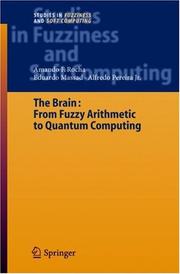
ISBN: 9783540218586 3540218580 9786610612956 1280612959 3540323570 Year: 2005 Publisher: Berlin, Germany ; New York, New York : Springer,
Abstract | Keywords | Export | Availability | Bookmark
 Loading...
Loading...Choose an application
- Reference Manager
- EndNote
- RefWorks (Direct export to RefWorks)
"The Brain- From Fuzzy Arithmetic to Quantum Computing" presents an original and astounding new understanding of the brain by taking into account novel achievements in Fuzziness and Quantum Information Theory. Bringing together Neuroscience, Soft Computing, Quantum Theory, and recent developments in mathematics the actual knowledge about the brain functioning is formalized into a coherent theoretical framework. This monograph develops new and powerful neural models providing formal descriptions of biochemical transactions in the brain to guide neuroscience experiments and to better interpret their results. This book demonstrates how the physiology of the neuron can be understood based on the fundamentals of fuzzy formal languages and introduces the basics of quantum computation and quantum information to the brain. It discusses how molecular transactions at the cellular level implement such concepts, shows how certain neural structures, like the dendritic spine, are specialized to function as quantum computing devices and demonstrates how the brain can be viewed as a quantum processing intelligent system.
Neural networks (Neurobiology) --- Bioinformatics. --- Fuzzy arithmetic. --- Soft computing. --- Réseaux neuronaux (Neurobiologie) --- Bio-informatique --- Arithmétique floue --- Informatique douce --- Bioinformatics --- Fuzzy arithmetic --- Soft computing --- Models, Theoretical --- Nuclear Physics --- Central Nervous System --- Logic --- Models, Biological --- Natural Science Disciplines --- Artificial Intelligence --- Physics --- Philosophy --- Investigative Techniques --- Disciplines and Occupations --- Computing Methodologies --- Nervous System --- Information Science --- Humanities --- Analytical, Diagnostic and Therapeutic Techniques and Equipment --- Anatomy --- Brain --- Fuzzy Logic --- Models, Neurological --- Quantum Theory --- Mathematics --- Civil & Environmental Engineering --- Human Anatomy & Physiology --- Engineering & Applied Sciences --- Health & Biological Sciences --- Civil Engineering --- Neuroscience --- Applied Mathematics --- Bio-informatics --- Biological informatics --- Biological neural networks --- Nets, Neural (Neurobiology) --- Networks, Neural (Neurobiology) --- Neural nets (Neurobiology) --- Mathematics. --- Neurosciences. --- Neurology. --- Artificial intelligence. --- Quantum computers. --- Applied mathematics. --- Engineering mathematics. --- Quantum Computing. --- Appl.Mathematics/Computational Methods of Engineering. --- Artificial Intelligence (incl. Robotics). --- Biology --- Information science --- Computational biology --- Systems biology --- Engineering --- Engineering analysis --- Mathematical analysis --- Computers --- AI (Artificial intelligence) --- Artificial thinking --- Electronic brains --- Intellectronics --- Intelligence, Artificial --- Intelligent machines --- Machine intelligence --- Thinking, Artificial --- Bionics --- Cognitive science --- Digital computer simulation --- Electronic data processing --- Logic machines --- Machine theory --- Self-organizing systems --- Simulation methods --- Fifth generation computers --- Neural computers --- Medicine --- Nervous system --- Neuropsychiatry --- Neural sciences --- Neurological sciences --- Medical sciences --- Math --- Science --- Data processing --- Diseases --- Cognitive computing --- Computational intelligence --- Arithmetic --- Fuzzy sets --- Cognitive neuroscience --- Neurobiology --- Neural circuitry --- Mathematical and Computational Engineering. --- Artificial Intelligence. --- Neurology .
Book
ISBN: 3540273174 Year: 2005 Publisher: Berlin, Heidelberg : Springer Berlin Heidelberg : Imprint: Springer,
Abstract | Keywords | Export | Availability | Bookmark
 Loading...
Loading...Choose an application
- Reference Manager
- EndNote
- RefWorks (Direct export to RefWorks)
Applied Fuzzy Arithmetic provides a well-structured compendium that offers both a deeper knowledge about the theory of fuzzy arithmetic and an extensive view on its applications in the engineering sciences, making it a resource for students, researchers, and practical engineers. The first part of the book gives an introduction to the theory of fuzzy arithmetic, which aims to present the subject in a well-organized and comprehensible form. The derivation of fuzzy arithmetic from the original fuzzy set theory and its evolution towards a successful implementation is presented with existing formulations of fuzzy arithmetic included and integrated in the overall context. The second part of the book presents a diversified exposition of the application of fuzzy arithmetic, addressing different areas of the engineering sciences, such as mechanical, geotechnical, biomedical, and control engineering.
Fuzzy arithmetic. --- Fuzzy logic. --- Arithmetic --- Fuzzy sets --- Nonlinear logic --- Fuzzy mathematics --- Logic, Symbolic and mathematical --- Fuzzy systems --- Engineering mathematics. --- Computer engineering. --- Artificial intelligence. --- Mechanical engineering. --- Biomedical engineering. --- Mathematical and Computational Engineering. --- Electrical Engineering. --- Artificial Intelligence. --- Mechanical Engineering. --- Control, Robotics, Mechatronics. --- Biomedical Engineering and Bioengineering. --- Computers --- Engineering --- Engineering analysis --- Mathematical analysis --- Clinical engineering --- Medical engineering --- Bioengineering --- Biophysics --- Medicine --- Engineering, Mechanical --- Machinery --- Steam engineering --- AI (Artificial intelligence) --- Artificial thinking --- Electronic brains --- Intellectronics --- Intelligence, Artificial --- Intelligent machines --- Machine intelligence --- Thinking, Artificial --- Bionics --- Cognitive science --- Digital computer simulation --- Electronic data processing --- Logic machines --- Machine theory --- Self-organizing systems --- Simulation methods --- Fifth generation computers --- Neural computers --- Design and construction --- Mathematics --- Applied mathematics. --- Electrical engineering. --- Control engineering. --- Robotics. --- Mechatronics. --- Mechanical engineering --- Microelectronics --- Microelectromechanical systems --- Automation --- Control engineering --- Control equipment --- Control theory --- Engineering instruments --- Programmable controllers --- Electric engineering
Book
Year: 2022 Publisher: Basel MDPI - Multidisciplinary Digital Publishing Institute
Abstract | Keywords | Export | Availability | Bookmark
 Loading...
Loading...Choose an application
- Reference Manager
- EndNote
- RefWorks (Direct export to RefWorks)
This book collects fifteen papers published in s Special Issue of Mathematics titled “Fuzzy Sets in Business Management, Finance, and Economics”, which was published in 2021. These paper cover a wide range of different tools from Fuzzy Set Theory and applications in many areas of Business Management and other connected fields. Specifically, this book contains applications of such instruments as, among others, Fuzzy Set Qualitative Comparative Analysis, Neuro-Fuzzy Methods, the Forgotten Effects Algorithm, Expertons Theory, Fuzzy Markov Chains, Fuzzy Arithmetic, Decision Making with OWA Operators and Pythagorean Aggregation Operators, Fuzzy Pattern Recognition, and Intuitionistic Fuzzy Sets. The papers in this book tackle a wide variety of problems in areas such as strategic management, sustainable decisions by firms and public organisms, tourism management, accounting and auditing, macroeconomic modelling, the evaluation of public organizations and universities, and actuarial modelling. We hope that this book will be useful not only for business managers, public decision-makers, and researchers in the specific fields of business management, finance, and economics but also in the broader areas of soft mathematics in social sciences. Practitioners will find methods and ideas that could be fruitful in current management issues. Scholars will find novel developments that may inspire further applications in the social sciences.
Research & information: general --- Mathematics & science --- Bonferroni means --- prioritized aggregation operators --- induced aggregation operators --- OWA operator --- transparency --- fuzzy sets --- fuzzy numbers --- linguistic variables --- fuzzy data analysis --- correlation between fuzzy variables --- poverty policy --- efficiency --- Debreu–Farrell productivity index --- cryptocurrencies --- bitcoin --- blockchain --- fintech --- unified theory of acceptance and use of technology --- intention to use --- fuzzy set qualitative comparative analysis --- bonus-malus system --- fuzzy number --- fuzzy transition probability --- fuzzy Markov chain --- fuzzy stationary state --- SDGs --- The Quintuple Helix of Innovation Model --- sustainability --- Latin America --- knowledge systems --- Forgotten Effects Theory --- Fuzzy Logic --- tourist destination competitiveness --- experton theory --- forgotten effects theory --- Hamming distance --- decision making --- expert group --- neuro-fuzzy assessment --- evaluation of specialists --- smart city --- assessment risk --- smart transport --- mobility --- transparent selection --- public financial resources --- recovery plan --- selection of quality methods --- manufacturing process --- intuitionistic fuzzy sets --- genetic algorithm --- adoption of environmental practices --- human resource costs --- organizational learning capability --- information technology support --- size --- education level --- experience --- university ranking --- unsupervised pattern recognition --- clustering techniques --- corruption perception --- corruption normalization --- gender --- entrepreneurial intention --- STEM --- family entrepreneurial background --- fsQCA --- household income --- pythagorean membership --- financial knowledge --- decision-making --- fuzzy logic --- fuzzy arithmetic --- extension principle --- economic models --- Harrod’s growth --- enhancement strategy --- brand attachment --- convenience stores --- fuzzy quality function deployment --- audit team leader --- audit risk assessment --- small- and medium-sized audit firms --- planification --- fuzzy theory --- Bonferroni means --- prioritized aggregation operators --- induced aggregation operators --- OWA operator --- transparency --- fuzzy sets --- fuzzy numbers --- linguistic variables --- fuzzy data analysis --- correlation between fuzzy variables --- poverty policy --- efficiency --- Debreu–Farrell productivity index --- cryptocurrencies --- bitcoin --- blockchain --- fintech --- unified theory of acceptance and use of technology --- intention to use --- fuzzy set qualitative comparative analysis --- bonus-malus system --- fuzzy number --- fuzzy transition probability --- fuzzy Markov chain --- fuzzy stationary state --- SDGs --- The Quintuple Helix of Innovation Model --- sustainability --- Latin America --- knowledge systems --- Forgotten Effects Theory --- Fuzzy Logic --- tourist destination competitiveness --- experton theory --- forgotten effects theory --- Hamming distance --- decision making --- expert group --- neuro-fuzzy assessment --- evaluation of specialists --- smart city --- assessment risk --- smart transport --- mobility --- transparent selection --- public financial resources --- recovery plan --- selection of quality methods --- manufacturing process --- intuitionistic fuzzy sets --- genetic algorithm --- adoption of environmental practices --- human resource costs --- organizational learning capability --- information technology support --- size --- education level --- experience --- university ranking --- unsupervised pattern recognition --- clustering techniques --- corruption perception --- corruption normalization --- gender --- entrepreneurial intention --- STEM --- family entrepreneurial background --- fsQCA --- household income --- pythagorean membership --- financial knowledge --- decision-making --- fuzzy logic --- fuzzy arithmetic --- extension principle --- economic models --- Harrod’s growth --- enhancement strategy --- brand attachment --- convenience stores --- fuzzy quality function deployment --- audit team leader --- audit risk assessment --- small- and medium-sized audit firms --- planification --- fuzzy theory
| Listing 1 - 10 of 11 | << page >> |
Sort by
|

 Search
Search Feedback
Feedback About
About Help
Help News
News